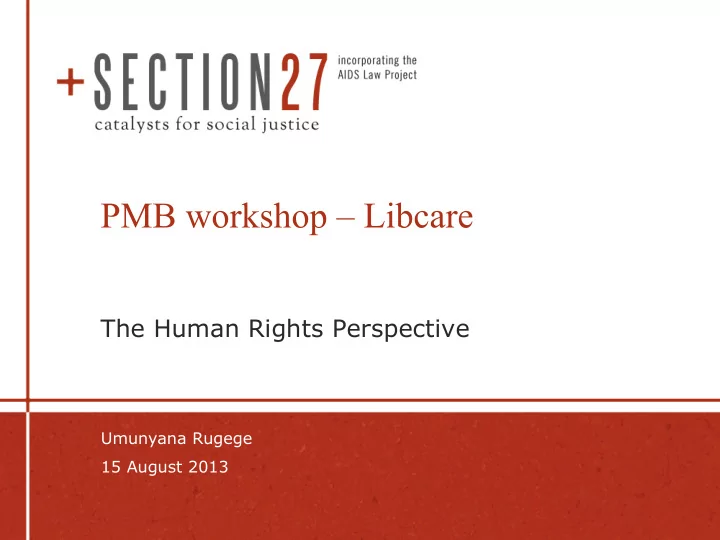

PMB workshop – Libcare The Human Rights Perspective Umunyana Rugege 15 August 2013
The Legal Framework for PMBs + Constitution + Medical Schemes Act + Regulations + National Health Act
Constitution + Preamble + Heal the divisions of the past and establish a society based on democratic values, social justice and human rights. + Improve the quality of life of all citizens and free the potential of each person.
Constitution (2) + Supreme law of the Republic; law or conduct inconsistent with it is invalid, and the obligations imposed by it must be fulfilled.
Right to Health + Section 27 of the Constitution + (1) everyone has the right to health care services + (2) state must take reasonable legislative and other measures, within available resources, to progressively realise right + (3) no one may be refused emergency medical treatment
National Health Act + Gives content to S 27. + Recognises the socio-economic injustices, imbalances and inequities of health services of the past. + Promotes spirit of co-operation and shared responsibility among public and private sectors. + Striving for a more equitable health system
Why is this relevant to the private medical scheme sector? + State obligation to make legal framework for fair and equitable health care in private sector. + MSA establishes regulator and sets standards for medical schemes to ensure right to health realised in private sector.
Why is this relevant to the private health sector? (2) + MSA establishes PMBs as minimum health care services to be provided in private sector. + Reg 8(1) “pay in full, without co- payment or deductibles”. + Establishes complaints mechanisms so that beneficiaries can enforce right to health.
Private sector responsibility for right to health + Compliance with the law – pay in full in every case and protect the right to health of beneficiaries. + S 8(2) Bill of Rights binds corporate entities taking account of nature of the right and nature of duty imposed. + Certainly duty not to interfere with access to health services – more?
Private sector responsibility for right to health (2) + S 27(3) application to private sector + Nature of the right – immediate, sudden, serious, future disability, life at stake. + Nature of the duty – may not refuse treatment, not dependent on ability to pay, stabilise (HASA guidelines determine EMT condition, stabilise and don’t consider ability to pay)
Private sector responsibility for right to health (3) + But unclear elements of duty – + Who pays for treatment? + Patient + State reimbursement + What is obligation to provide EMT services / provide access to existing services. + Requires legislative clarity.
PMBs Rights concerns + Interpretation of Reg 8(1) – BHF case shows industry practice that limits beneficiaries’ access to health. + BHF interpretation undermines meaning and purpose of PMBs. + Evidence of devastating effect on medical schemes of ‘blank cheque’? CMS says no evidence and no basis for BHF interpretation.
PMBs Rights concerns (2) + Co-payments require families to cut other necessary expenses, incur debt, utilise retirement/savings, pay additional insurance (gap cover). + Co-payments for efficiency purposes (Reg 8(4)) are questionable; doesn’t fit with rationale to increase efficiency of schemes for benefit of all beneficiaries.
PMBs Rights concerns (3) + Formularies – lack of transparency and + Public sector as standard for PMB cover. + General waiting periods for emergencies – no rationale unlike other PMBs; particular nature of the right.
Pricing of health care services + High prices underlie issues such as non-payment of PMBs, improperly imposing co-payments, lack of transparency on formularies. + State obligation to address prices when prices are barrier to access. + A range of processes underway – HPCSA ethical tariffs, market inquiry, piloting NHI.
What is required now? + Clarification of Reg 8(1) + Review of PMBs biannually + Review of PMB framework that in practice limits access + Strengthen complaints system (CMS) + Greater accountability of schemes
Thanks + rugege@section27.org.za + 011 356 4100
Recommend
More recommend